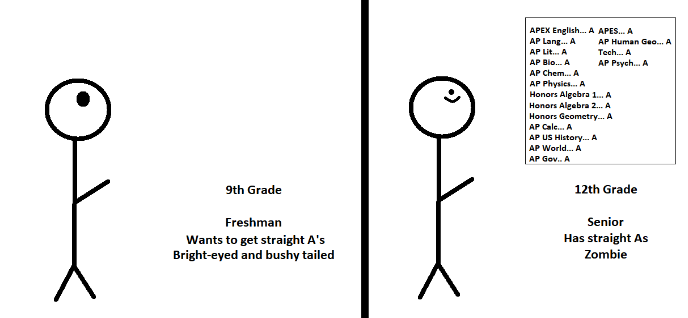Many students at our school are known to have a strong drive to succeed academically. They aim for high GPA’s, straight A’s, and yearn to get into high-level universities. Establishing strong goals for oneself has always been a key element necessary for success, not only in high school and in college, but in life and adulthood as well.
However, there is no doubt that putting too much effort into doing well at school can impact the lives of students. A 2019 study by Pew Research Center that examined the main sources of pressure for teenagers found that 61% of those teenagers are stressed due to academics and schoolwork.
The importance of maintaining a healthy balance between school work and other activities, from jobs and volunteer work to rest and relaxation, cannot be overstated. Staying up until three o’clock in the morning, working long hours after classes at school on challenging, even unfamiliar courses, as well as extracurriculars and sports (which are also taken into consideration by colleges) have become incredibly common around the school. It could be argued that taking many Honors and AP courses would increase a student’s GPA and grant access to good universities, otherwise difficult to get into with “average” grades. Although that is true to an extent, rigorous classes that carry weight must be taken in moderation.
For example, a student who is weak in science would benefit more from getting a good grade in on level chemistry, rather than taking a subject such as AP Chemistry. It should be stressed that grasping the material is more important than taking difficult classes. Additionally, while scoring well in classes is key, a few B’s among the many A’s would not hurt one’s GPA badly, even for weighted courses.
According to math teacher Laura Brager, the common attitude towards excelling in school should be turned around to focus on the individual needs of students.
“I think it really comes down to the mentality of schools like WJ and other schools in the county. […] Finding a way to kind of change the message we’re sending. So I think, historically, we’re sending a message that’s like, ‘Everyone has to get 4.0 [GPA]’s, everyone has to take the hardest classes,’ when really, it should be a lot more student-centered, and it should be more focused on what is best for the specific students,” Brager said.
It is also beneficial for students to prioritize their physical needs, like their sleep. A study conducted by a pediatrician at Johns Hopkins Medicine, Michael Crocetti, specifies that teenagers need roughly nine hours of sleep at night. Yet, it is not uncommon for high schoolers to sleep for only about three or four hours, which can cause both physical and mental health problems for them.
“Focusing intensely on academics becomes a problem like when it starts to be in the way of students’ mental health, so most specifically, sleeping. When they’re choosing to do work, or study, at the cost of getting a full sleep, or when they’re sick,” Brager said.
In the end, if students are to enter good universities, then we must be able to do so with strength and fresh minds, so excessively worrying about good grades and high GPA’s before the next stage of our lives would leave us drained and ill-equipped to take on the challenges that higher education has to offer.




































